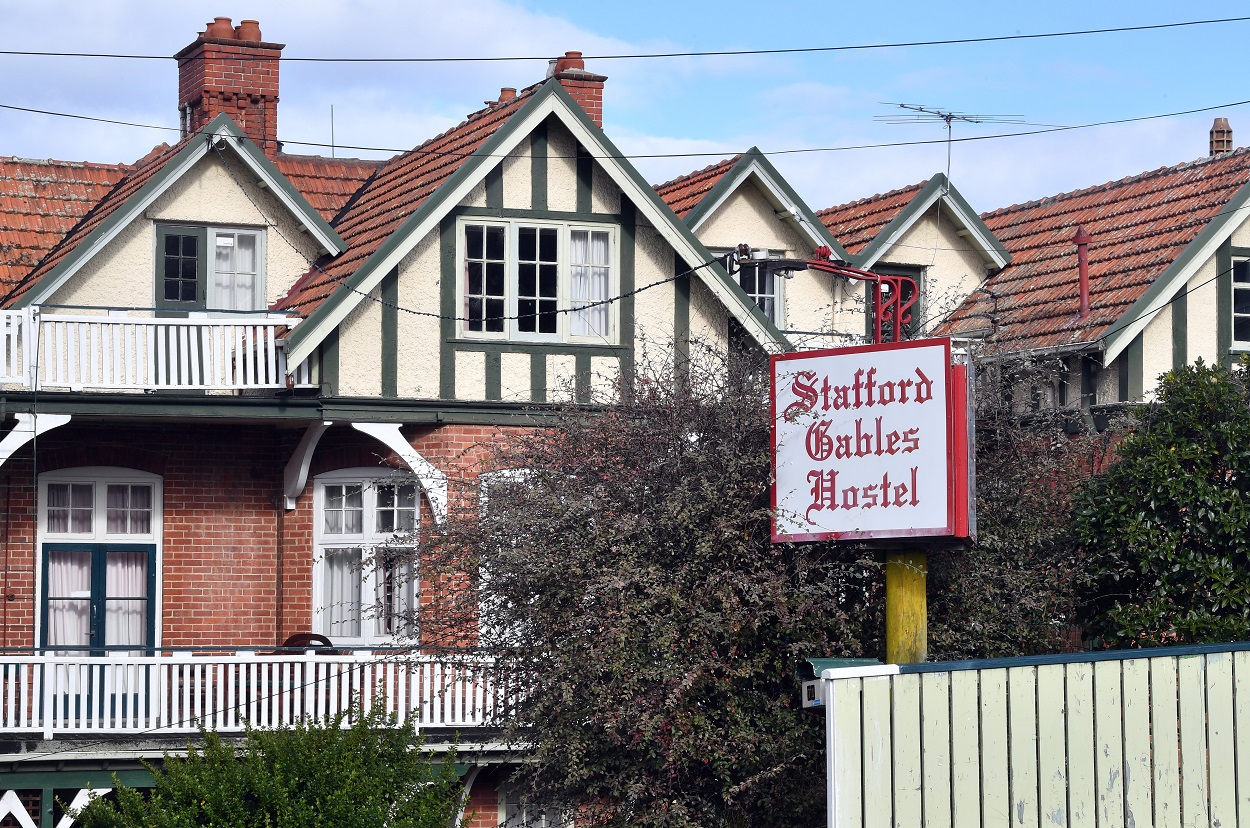

The Otago Daily Times has uncovered the hostel’s use as part of the paper’s special investigation "Houses of Horror".
The investigation has exposed homeless people living in dire conditions without support for complex needs, such as mental illness or addictions.
We found at least two homeless people in Stafford Gables — and a stack of uncollected mail from the Ministry of Social Development and Department of Justice.
In January this year, Stuff reported the hostel charged $600 a night to a family of concert-goers for a room with "broken beds and poo in the corner".
An older Tripadvisor review says "sleep in the park, go and cuddle up with a meth addict — you’ll be better off than staying here".
The practice of "mixed use" — hostels housing homeless people as well as visitors — was slammed as "dangerous" by Backpacker Youth and Adventure Tourism Association (BYATA) chairman Haydn Marriner, who called for government rules to end it.
"Combining young people who are travelling, with homeless people in emergency accommodation is dangerous.
"We have regulations to keep our visitors safe when they do activities, we should regulate to prevent this practice, too."
Mr Marriner said the pandemic’s tourism decline, combined with a shortage of social housing, meant more than half of backpacker accommodation had disappeared across New Zealand, with a significant amount "repurposed" for the homeless.
Buildings that switched under the same owner to house the homeless were "not the highest quality accommodation — it was the bottom end of the budget".
The ODT investigation also found some backpackers had shut down after housing homeless people during the border lockdowns, including Stafford St’s Geeky Gecko Backpackers.
Geeky Gecko former manager Ben Luke said "homeless people was never going to mix with young backpackers".
"I didn’t feel comfortable taking both but the owner wanted me to.
"Then the borders shut and everyone in the building was homeless.
"I helped as much as I could."
Mr Luke said the hostel shut down after building compliance issues, and about 12 homeless occupants were moved on — mainly to other boarding houses.
Hogwartz, another Dunedin backpacker hostel, shut down and is now under new ownership — as a boarding house.
The few Dunedin backpacker hostels still open, and not accepting homeless people wanting to stay long term, said they were "constantly" turning homeless people away — but could not accept them after experiencing "risky" interactions with guests.
Manor House Backpackers owner Maui Masina said he had taken homeless people during the pandemic but stopped because it was "like I was running Wakari mental hospital".
"It was horrible," Mr Masina said.

"There should be more help for those who need it — we would love to help, but we don’t have the means.
"We are a family business."
On Top Backpackers owner Matt Easton said "you can’t do both".
"I stopped doing it.
"I was always having to call the boys in blue."
Chalet Backpackers owner Richard Hancox said they were not a social service.
"If we mix emergency housing for the homeless with being a backpackers then we are no longer a backpackers.
"This is not to say we don’t have sympathy with the homeless."
Mr Marriner, of BYATA, said backpacker owners who converted to being boarding houses did it to "make money while not investing in their property".
"These buildings are inappropriate for the youth market — or any human being.
"The hard part is that our members are then tarred with the same brush and there is brand damage to New Zealand that will have ripple effects for years."
A lack of social housing and support "can’t just magically be remedied with the wave of a wand", Mr Marriner said.
"There is going to be a pain period — but there has to be smarter ways than mixed use, which creates danger.
"Backpacker managers and owners are not social workers."
Cold, dark rooms for $100
When asked for an interview, a Stafford Gables spokesperson said they would call back — but did not.
An ODT reporter then went undercover, posing as a homeless person needing a room — and was told by a Stafford Gables representative: "I will have to check if there are any free".
The reporter was called back and a building tour arranged. They were shown around silent, dark corridors with bad smells, and cold, empty dormitories.
The reporter was told the hot water was "a bit unstable" and "[wasn’t] really there" in two bathrooms — and was quoted $100 a night for a room for two people.
There was no evidence of any backpacker guests, and the Stafford Gables representative said there were Work and Income clients, too.
"We have a couple downstairs and another upstairs — and tourists come and go."
The reporter was told the owners did not like Work and Income clients staying very long, because they were a backpackers.
Stafford Gables is still advertised on Agoda, but despite the building appearing largely empty, the ODT could not find any available dates online.
The ODT visited the building again, seeking the owner. We were unsuccessful but found at least two occupants — and mail in the hall from the Ministry of Social Development and Ministry of Justice.
A Stafford Gables spokesperson then rang to say they knew we had visited, adding the owner wanted to "remain anonymous and respectfully decline an interview".
The owner has hidden their name from public view on the register of building owners. — Additional reporting Laine Priestley









